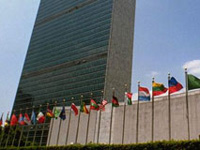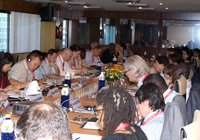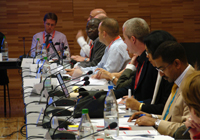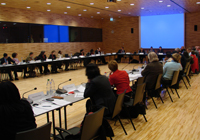CEOs from the world’s leading companies, including Levi Strauss & Co., The Coca-Cola Company, Johnson & Johnson, Aetna, H&M and more, call on 46 countries to repeal HIV-related travel restrictions
WASHINGTON (22 July 2012) – Prominent CEOs from the world’s leading companies, including Levi Strauss & Co., The Coca-Cola Company, Johnson & Johnson, the National Basketball Association (NBA) and Virgin Unite, called today on 46 countries to lift travel restrictions for HIV-positive people.
More than 20 CEOs from leading companies have signed a pledge to oppose HIV-related restrictions on entry, stay and residence, saying such laws and policies are not only discriminatory, they are bad for business.
CEOs from the following companies have joined the pledge: Access Bank Plc, Aetna, Anglo American plc, BD, BET Networks, Bristol-Myers Squibb Company, The Coca-Cola Company, Gap Inc., Getty Images, Gilead Sciences, Inc., H&M Hennes & Mauritz AB, HEINEKEN NV, Hub One International Company Ltd., Johnson & Johnson, Kenneth Cole Productions, Levi Strauss & Co., Merck & Co., Mylan, National Basketball Association (NBA), Nordstrom, Inc, OraSure Technologies, Inc., Vestergaard Frandsen, Virgin Unite, and the former Chairman of MTVN International.
The pledge was launched opening day of the International AIDS Conference in Washington, DC, where 30,000 people from 200 countries are meeting from July 22-27. The world’s largest AIDS conference, it is taking place in the United States for the first time in 22 years because in 2010 President Obama lifted the US travel ban against people living with HIV, the same year thatChina ended its travel ban.
Levi Strauss & Co.’s CEO Chip Bergh was the first to sign. "HIV-related travel restrictions not only hurt individuals, they also hurt businesses,” Bergh said. “In today’s competitive landscape where global business travel is essential, we need to be able to send our talent and skills where they’re needed. We call on countries with these restrictions to rescind them immediately."
The pledge is an initiative of UNAIDS in partnership with GBCHealth, which is mobilizing the corporate signatures. Formerly called the Global Business Coalition on HIV/AIDS, Tuberculosis and Malaria, GBCHealth is a coalition of companies that address global health challenges.
“Travel restrictions for people living with HIV are blatant discrimination,” said Richard Branson, Founder of Virgin Unite. “Everyone should have a chance to travel freely. Treatment has allowed people with HIV to live fully productive lives and these laws and policies are downright archaic. I urge governments around the world to repeal their bans and encourage business leaders to join me in taking a stand."
Most HIV-related travel restrictions were imposed by governments in the early days of the epidemic when ignorance and fear surrounded the transmission of HIV and treatment did not exist. Since then we’ve learned that such measures do not protect public health and that there is no economic justification for them, especially as antiretroviral therapy now enables people living with HIV to be fully productive employees.
“There is no evidence that these restrictions protect public health,” said Michel Sidibé, Executive Director of UNAIDS. “They are discriminatory and violate international human rights standards. People living with HIV should have equal access to opportunity and freedom of movement in today’s globalized world.”
UNAIDS counts 46 countries, territories and areas that have some form of restriction on entry, stay or residence based on the HIV-status of those seeking to enter or remain. Some countries deny travel for short-term stays, such as business trips or conferences; and some deny longer- term stays or residence, such as work-related moves, migration, study abroad programs and diplomatic and consular postings.
Five countries have a complete bar on the entry and stay of people with HIV for any reason or any length of time. An additional five countries require that a person show that he/she is HIV- negative even for short stays. Twenty countries deport individuals once their HIV infection is discovered. Varying forms of restrictions exist in other countries.
“These outdated laws and policies make no sense in today’s globalized world, where work- related travel is routine for corporations,” said Michael Schreiber, Managing Director of GBCHealth. “Companies need to send their employees overseas, regardless of their HIV status.”
Many countries have lifted their travel restrictions, including most recently, Namibia, Ukraine, Armenia, Fiji and the Republic of Moldova.
UNAIDS and the Republic of Korea (South Korea) will co-host today a satellite session at the International AIDS Conference on the latest developments in efforts to end travel restrictions and uphold equal freedom of movement for people living with HIV.
The CEO campaign is just beginning with a goal of obtaining more than 100 signatures by World AIDS Day 2012 on December 1st.
“The private sector can influence these governments to do the right thing,” Schreiber said. “We call on CEOs to show your leadership by joining the pledge to end discrimination of people with HIV.”
See countries, fact sheets and up-to-date list of CEOs
Below are CEOs who have signed as of 19 July, 2012:
Aigboje Aig-Imoukhuede, Group Managing Director/CEO, Access Bank Plc
Mark Bertolini, Chairman, CEO and President, Aetna
Cynthia Carroll, Chief Executive, Anglo American plc
Vincent A. Forlenza, Chairman of the Board, CEO and President, BD
Debra Lee, Chairman & CEO, BET Networks
Lamberto Andreotti, CEO, Bristol-Myers Squibb Company
Muhtar Kent, Chairman of the Board and CEO, The Coca-Cola Company
Glenn K. Murphy, Chairman and CEO, Gap Inc.
Jonathan D. Klein, CEO and Co-Founder, Getty Images
John C. Martin, PhD, Chairman and CEO, Gilead Sciences, Inc.
Karl-Johan Persson, CEO, H&M Hennes & Mauritz AB
Jean-François van Boxmeer, Chairman of the Executive Board/CEO, HEINEKEN NV
Bong Yong Dam, CEO, Hub One International Company Ltd.
Alex Gorsky, CEO, Johnson & Johnson
Kenneth Cole, Chairman and Chief Creative Officer, Kenneth Cole Productions
Chip Bergh, President & CEO, Levi Strauss & Co.
Kenneth C. Frazier, Chairman, President & CEO, Merck & Co.
Heather Bresch, CEO, Mylan
David J. Stern, Commissioner, National Basketball Association (NBA)
Blake Nordstrom, President, Nordstrom, Inc.
Douglas A. Michels, President & CEO, OraSure Technologies, Inc.
Mikkel Vestergaard Frandsen, CEO, Vestergaard Frandsen
Richard Branson, Founder, Virgin Unite
William H. Roedy, AIDS Activist and former Chairman, MTVN International












